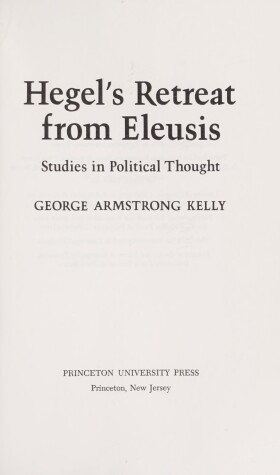Concentrating on Hegel's political philosophy, George Armstrong Kelly pursues three lines of inquiry. The first is the broad question of the connection of philosophy, politics, and history within Hegel's system of thought. Second, the author explores Hegel's relationship with his surrounding political culture and his rejection of aestheticism for the higher goal of politics. Finally, he analyzes Hegel's theory of the state, its historical and structural foundations, its demolition by a later generation, and its relevance. Professor Kelly explains how Hegel's total philosophical method and system convey his apprehension of the meaning of European culture and its links with a political harmony accessible to modern times.
Professor Kelly explains how Hegel's total philosophical method and system convey his apprehension of the meaning of European culture and its links with a political harmony accessible to modern times.
Originally published in 1978.
The Princeton Legacy Library uses the latest print-on-demand technology to again make available previously out-of-print books from the distinguished backlist of Princeton University Press. These editions preserve the original texts of these important books while presenting them in durable paperback and hardcover editions. The goal of the Princeton Legacy Library is to vastly increase access to the rich scholarly heritage found in the thousands of books published by Princeton University Press since its founding in 1905.
- ISBN10 0691075891
- ISBN13 9780691075891
- Publish Date 21 April 1978
- Publish Status Out of Print
- Out of Print 19 March 2021
- Publish Country US
- Imprint Princeton University Press
- Format Hardcover
- Pages 272
- Language English
